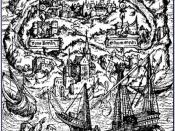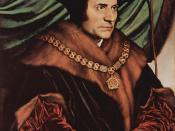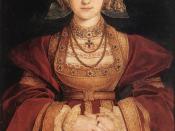The "Middle" Ages were followed by the Renaissance, a time in which art and literature flourished. Thomas More, the first English humanist of the Renaissance, was born in London during this period. More's style is simple because of its colloquial language but a deeper look into his irony hints at deep dissatisfaction with the current thought and desire for change. "Utopia" (which in Greek means "nowhere") is the name of More's fictional island of perfected society. Thomas More's "Utopia" was the first literary work in which the ideas of Communism appeared and was highly esteemed by all the humanists of Europe in More's time. More uses the main character, Hythlodaeus, as a fictional front to express his own feelings he may have feared to express in non-fiction because of his close ties with the King Henry VIII.
In the first of the two books that make up "Utopia", the author gives a profound and accurate picture of the European citizens' sufferings and points out the social evils that existed in England at the time.
Hythlodaeus (More) begins his assault on feudalism by explaining that his views and the ideals of Utopia can never exist without common land. At this time, feudalism was still the dominant social order in most of Europe. As the enclosure movement began in Europe, most of the land was beginning to be closed off to farmers and was sectioned off for grazing cattle and sheep. This exacerbated the already desperate situation in England in which poor farmers were only able to have land by paying their land-owner with the crops they harvested from the land with little to no profit for themselves. More creates a Utopia in which people do not attempt to expand their frontiers and even give their surplus from the harvest to...


